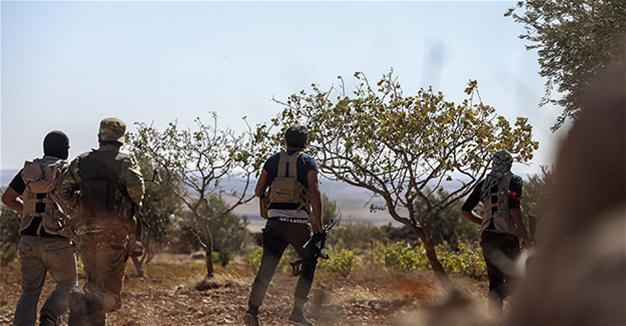Turkey criticizes US over ‘inconsistency and disjointedness’ in Middle East
ANKARA

AA Photo
Turkish President Recep Tayyip Erdoğan has slammed the United States for the “inconsistency and disjointedness” of its policies on the Middle East, as one part of the Obama administration continues to insist on allying with Syria’s Democratic Union Party (PYD), an organization that Ankara regards as an associate of the outlawed Kurdistan Workers’ Party (PKK).
“We are making efforts to continue our relations with the U.S. in the spirit of our traditional alliance. However, we have been witnessing grave signs of inconsistency and disjointedness in U.S. policies in our region, particularly in recent times,” Erdoğan said in his address to parliament to mark the start of the new legislative year on Oct. 1.
“A section of the U.S. administration insists on working jointly with the PKK/PYD-YPG [People’s Protection Units] terrorist organization in Syria and Iraq, while another section tries to pursue policies that are sympathetic to our sensitivities,” he added.
Ankara believes that the Department of Defense is in favor of continuing cooperation with the PYD, particularly in the upcoming Raqqa operation, while the State Department has urged the administration to be sensitive to Ankara’s concerns.
“This situation is apparently caused by the upcoming presidential elections in the U.S., so we will continue to work to solve this problem without harming the vital interests of our country,” Erdoğan said.
Turkey and the U.S. have held lengthy meetings at various levels over the past two months to resolve differences over which local forces the international coalition should work to defeat the Islamic State of Iraq and the Levant (ISIL) in north Syria. Washington has announced that it will continue to supply weapons and ammunition to the PYD, which it sees as the best group of fighters against ISIL.
‘Anti-Saudi bill unfortunate’ Another issue that Erdoğan raised in his address to parliament was legislation recently passed by the U.S. Congress, allowing lawsuits to be filed against Saudi Arabia for the 9/11 attacks, describing the legislation as “unfortunate.”
“First of all, this legislation is clearly against the ‘personal nature of criminal responsibility,’ a universal legal principle. We are hoping that this wrong step will soon be taken back, as it has the potential of creating a dangerous debate over the sovereign rights of states,” he said.
‘Turkey should be at Syria table’ Addressing Turkey’s unilateral Euphrates Shield Operation targeting ISIL and the PYD in northern Syria, Erdoğan stressed that the move stopped the PYD from link two of its cantons through “terrorist corridor” along Turkey’s southern borders.
“The successful continuation of the operation has shown us that if the necessary support is provided, Syria can fight DAESH [an Arabic acronym of ISIL] with its own children. The argument of those who try to use one terrorist organization, the PYD-YPG, to fight against DAESH, has been refuted through the Euphrates Shield Operation,” he said.
“We as Turkey cannot stay away from the table. We have to be at the table,” Erdoğan stressed, recalling that Turkey shares a 911 km-long border with Syria and a nearly 350 km-long border with Iraq.
‘Mosul can be freed by Arab and Turcoman forces’Drawing attention to the soon-to-be-launched Mosul operation to force ISIL out of Iraq’s second-largest city, the Turkish president said a military offensive should be conducted with the participation of local groups but not Syrian Kurdish groups.
“A similar game is being played in Mosul by Shiite militias and members of the [PYD] terrorist organization, which is an extension of the PKK, in complete contradiction with the sectarian and ethnic fabric of the region, as well as its cultural sensitivities,” he said.
“Turkey believes that Mosul can be saved from DAESH in cooperation with groups that are essential elements of the region, and especially by extending the necessary support to Arab and Turcoman forces. We will continue to exert every effort in order to ensure that Mosul is not pulled into sectarian and ethnic conflicts,” Erdoğan said, noting that Tal Afar to the north of Mosul has a population made up heavily of Turkmens.
Russia, Israel, Iran…President Erdoğan’s address also referred to Ankara’s ties with Russia, Israel and Iran.
“We will continue to work on our differences in a number of issues with [Russia], but we will also focus on our common interests to develop our relations even higher than their previous level. Our relations in many fields, including energy, tourism, and agricultural exports, are already approaching their previous level at a great pace,” he said.
On Israel, Erdoğan stressed that the Israeli government has “met all of Turkey’s conditions about the Mavi Marmara incident.”
“We are trying to develop our mutual relations with the intention of producing fruitful results for everyone in our region, first and foremost for our Palestinian brothers and sisters,” he said.
Describing Iran as “another important player in the region,” Erdoğan stressed that Ankara and Tehran have had intensive contacts to “overcome differences of opinion in a number of issues, including Syria and Iraq.”
“In principle, we have major energy, transportation, infrastructure and cultural cooperation projects that we can mobilize in the region with Iran. We will continue to develop our relations with Iran in an approach that foregrounds our common denominators,” he said.
